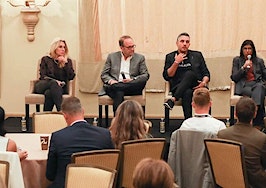Brad Bjelke, CEO of the biggest multiple listing service (MLS) in Utah, said Friday that disruptive new business models, such as iBuying, approach real estate as a commodity and are creating a scenario in which home prices fluctuate much as corporate stocks do.
Bjelke comments kicked off the final day of the Council of Multiple Listing Services’s 2019 conference in Salt Lake City. Overall, Bjelke was bullish on the prospects of MLSs, saying that the trade organizations are “the gate keepers” of real estate data and can guide the industry through this period of change.
But he was also frank that real estate is facing real challenges, in part thanks to the rise of “institutional buyers” who “look at our industry as a commodity.” That contrasts with the more emotional approach that individual homebuyers usually have.
Bjelke specifically mentioned that iBuyers are part of this trend, noting that in some markets iBuying — which is dominated by companies such as Opendoor and Offerpad — are “approaching 15 percent of all sales.”
These changes are already impacting the housing market, with Bjelke saying that in some cases the “status and price of homes are changing up to 20 times a day.”
“Let’s envision a time when that’s 100 times a day,” Bjelke said. “Home prices may trade like corporate shares on the stock market.”

Brad Bjelke at CMLS 2019 in Salt Lake City Friday | Credit: Jim Dalrymple II
In the context of these changes, Bjelke said that he has “concerns” that too many multiple listing services are afraid of change and prefer to operate in the dark. He didn’t name names, but added that some MLSs and their leaders are “digging their heels in.”
That isn’t the best way to cope with these changes, Bjelke argued Friday. He compared current changes in the industry to the way that video streaming has replaced cable and satellite or the way cassette tapes were replaced by CDs and other music formats. And he said that MLSs need to “stop being illogical.”
He also urged MLS leaders to ask themselves if they are doing what is best for consumers, for their agents, all the while “making the real estate experience better.”
“Don’t protect the status quo for the sake of the status quo,” Bjelke said. “Do what’s best for your members.”













